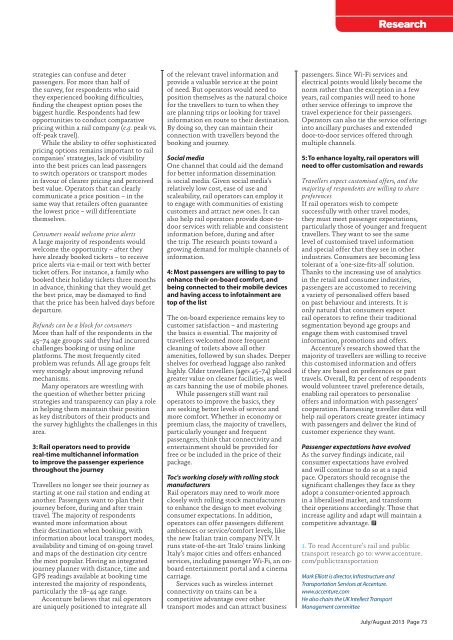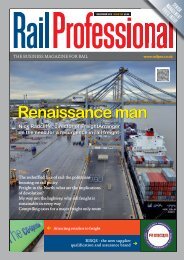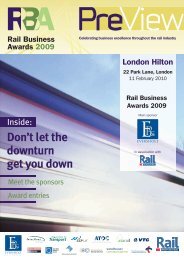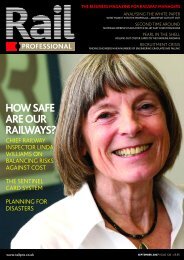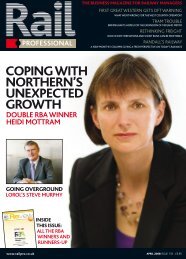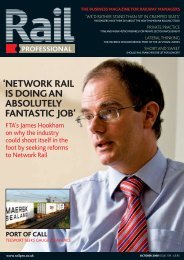View as PDF - Rail Professional
View as PDF - Rail Professional
View as PDF - Rail Professional
Create successful ePaper yourself
Turn your PDF publications into a flip-book with our unique Google optimized e-Paper software.
Research<br />
strategies can confuse and deter<br />
p<strong>as</strong>sengers. For more than half of<br />
the survey, for respondents who said<br />
they experienced booking difficulties,<br />
finding the cheapest option poses the<br />
biggest hurdle. Respondents had few<br />
opportunities to conduct comparative<br />
pricing within a rail company (e.g. peak vs.<br />
off-peak travel).<br />
While the ability to offer sophisticated<br />
pricing options remains important to rail<br />
companies’ strategies, lack of visibility<br />
into the best prices can lead p<strong>as</strong>sengers<br />
to switch operators or transport modes<br />
in favour of clearer pricing and perceived<br />
best value. Operators that can clearly<br />
communicate a price position – in the<br />
same way that retailers often guarantee<br />
the lowest price – will differentiate<br />
themselves.<br />
Consumers would welcome price alerts<br />
A large majority of respondents would<br />
welcome the opportunity – after they<br />
have already booked tickets – to receive<br />
price alerts via e-mail or text with better<br />
ticket offers. For instance, a family who<br />
booked their holiday tickets three months<br />
in advance, thinking that they would get<br />
the best price, may be dismayed to find<br />
that the price h<strong>as</strong> been halved days before<br />
departure.<br />
Refunds can be a block for consumers<br />
More than half of the respondents in the<br />
45–74 age groups said they had incurred<br />
challenges booking or using online<br />
platforms. The most frequently cited<br />
problem w<strong>as</strong> refunds. All age groups felt<br />
very strongly about improving refund<br />
mechanisms.<br />
Many operators are wrestling with<br />
the question of whether better pricing<br />
strategies and transparency can play a role<br />
in helping them maintain their position<br />
<strong>as</strong> key distributors of their products and<br />
the survey highlights the challenges in this<br />
area.<br />
3: <strong>Rail</strong> operators need to provide<br />
real-time multichannel information<br />
to improve the p<strong>as</strong>senger experience<br />
throughout the journey<br />
Travellers no longer see their journey <strong>as</strong><br />
starting at one rail station and ending at<br />
another. P<strong>as</strong>sengers want to plan their<br />
journey before, during and after train<br />
travel. The majority of respondents<br />
wanted more information about<br />
their destination when booking, with<br />
information about local transport modes,<br />
availability and timing of on-going travel<br />
and maps of the destination city centre<br />
the most popular. Having an integrated<br />
journey planner with distance, time and<br />
GPS readings available at booking time<br />
interested the majority of respondents,<br />
particularly the 18–44 age range.<br />
Accenture believes that rail operators<br />
are uniquely positioned to integrate all<br />
of the relevant travel information and<br />
provide a valuable service at the point<br />
of need. But operators would need to<br />
position themselves <strong>as</strong> the natural choice<br />
for the travellers to turn to when they<br />
are planning trips or looking for travel<br />
information en route to their destination.<br />
By doing so, they can maintain their<br />
connection with travellers beyond the<br />
booking and journey.<br />
Social media<br />
One channel that could aid the demand<br />
for better information dissemination<br />
is social media. Given social media’s<br />
relatively low cost, e<strong>as</strong>e of use and<br />
scaleability, rail operators can employ it<br />
to engage with communities of existing<br />
customers and attract new ones. It can<br />
also help rail operators provide door-todoor<br />
services with reliable and consistent<br />
information before, during and after<br />
the trip. The research points toward a<br />
growing demand for multiple channels of<br />
information.<br />
4: Most p<strong>as</strong>sengers are willing to pay to<br />
enhance their on-board comfort, and<br />
being connected to their mobile devices<br />
and having access to infotainment are<br />
top of the list<br />
The on-board experience remains key to<br />
customer satisfaction – and m<strong>as</strong>tering<br />
the b<strong>as</strong>ics is essential. The majority of<br />
travellers welcomed more frequent<br />
cleaning of toilets above all other<br />
amenities, followed by sun shades. Deeper<br />
shelves for overhead luggage also ranked<br />
highly. Older travellers (ages 45–74) placed<br />
greater value on cleaner facilities, <strong>as</strong> well<br />
<strong>as</strong> cars banning the use of mobile phones.<br />
While p<strong>as</strong>sengers still want rail<br />
operators to improve the b<strong>as</strong>ics, they<br />
are seeking better levels of service and<br />
more comfort. Whether in economy or<br />
premium cl<strong>as</strong>s, the majority of travellers,<br />
particularly younger and frequent<br />
p<strong>as</strong>sengers, think that connectivity and<br />
entertainment should be provided for<br />
free or be included in the price of their<br />
package.<br />
Toc's working closely with rolling stock<br />
manufacturers<br />
<strong>Rail</strong> operators may need to work more<br />
closely with rolling stock manufacturers<br />
to enhance the design to meet evolving<br />
consumer expectations. In addition,<br />
operators can offer p<strong>as</strong>sengers different<br />
ambiences or service/comfort levels, like<br />
the new Italian train company NTV. It<br />
runs state-of-the-art 'Italo' trains linking<br />
Italy’s major cities and offers enhanced<br />
services, including p<strong>as</strong>senger Wi-Fi, an onboard<br />
entertainment portal and a cinema<br />
carriage.<br />
Services such <strong>as</strong> wireless internet<br />
connectivity on trains can be a<br />
competitive advantage over other<br />
transport modes and can attract business<br />
p<strong>as</strong>sengers. Since Wi-Fi services and<br />
electrical points would likely become the<br />
norm rather than the exception in a few<br />
years, rail companies will need to hone<br />
other service offerings to improve the<br />
travel experience for their p<strong>as</strong>sengers.<br />
Operators can also tie the service offerings<br />
into ancillary purch<strong>as</strong>es and extended<br />
door-to-door services offered through<br />
multiple channels.<br />
5: To enhance loyalty, rail operators will<br />
need to offer customisation and rewards<br />
Travellers expect customised offers, and the<br />
majority of respondents are willing to share<br />
preferences<br />
If rail operators wish to compete<br />
successfully with other travel modes,<br />
they must meet p<strong>as</strong>senger expectations,<br />
particularly those of younger and frequent<br />
travellers. They want to see the same<br />
level of customised travel information<br />
and special offer that they see in other<br />
industries. Consumers are becoming less<br />
tolerant of a 'one-size-fits-all' solution.<br />
Thanks to the incre<strong>as</strong>ing use of analytics<br />
in the retail and consumer industries,<br />
p<strong>as</strong>sengers are accustomed to receiving<br />
a variety of personalised offers b<strong>as</strong>ed<br />
on p<strong>as</strong>t behaviour and interests. It is<br />
only natural that consumers expect<br />
rail operators to refine their traditional<br />
segmentation beyond age groups and<br />
engage them with customised travel<br />
information, promotions and offers.<br />
Accenture’s research showed that the<br />
majority of travellers are willing to receive<br />
this customised information and offers<br />
if they are b<strong>as</strong>ed on preferences or p<strong>as</strong>t<br />
travels. Overall, 82 per cent of respondents<br />
would volunteer travel preference details,<br />
enabling rail operators to personalise<br />
offers and information with p<strong>as</strong>sengers’<br />
cooperation. Harnessing traveller data will<br />
help rail operators create greater intimacy<br />
with p<strong>as</strong>sengers and deliver the kind of<br />
customer experience they want.<br />
P<strong>as</strong>senger expectations have evolved<br />
As the survey findings indicate, rail<br />
consumer expectations have evolved<br />
and will continue to do so at a rapid<br />
pace. Operators should recognise the<br />
significant challenges they face <strong>as</strong> they<br />
adopt a consumer-oriented approach<br />
in a liberalised market, and transform<br />
their operations accordingly. Those that<br />
incre<strong>as</strong>e agility and adapt will maintain a<br />
competitive advantage.<br />
1. To read Accenture’s rail and public<br />
transport research go to: www.accenture.<br />
com/publictransportation<br />
Mark Elliott is director, Infr<strong>as</strong>tructure and<br />
Transportation Services at Accenture.<br />
www.accenture.com<br />
He also chairs the UK Intellect Transport<br />
Management committee<br />
July/August 2013 Page 73


